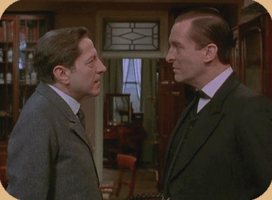Sherlock Holmes and his illnesses

Author: SherlockExtra - Translator: Revati
I. – Introduction
People were always curious of the lives and illnesses of famous persons. Maladies accompany life and many people endure sufferings much easier when they realize that others had/have the same problems – this way they feel that they’re not alone. Since his adventures were published, many people wanted to know what illnesses the great detective, Sherlock Holmes had.
In this long article we would like to analyze this interesting topic. We understand Sherlock’s personality better when we take into consideration and examine even the smallest details, just like he does. Sadly there are lots of misbeliefs around the sleuth, several illnesses are wrongly associated to him. We’d like to study these misconceptions and their harmful effects as well.
II. - A man who never died
First of all we have to lay down that Sherlock Holmes had no illnesses at all – because the popular resident of Baker Street never really existed (Link: Most common misbeliefs – Sherlock Holmes is alive). He’s the creation of a fantastic writer, Sir Arthur Conan Doyle, and he came into life in the minds and hearts of people. Therefore we talk about him as if he was alive. Thanks to this popularity he achieved the wonder of never dying – not even when his creator was fed up with him. His fans demanded his return from the deadly Reichenbach Falls. Doyle paid attention to the fact that no one stays young, his hero became older as the years passed, just like everyone else in the real world. So Holmes is immortal, he glows forever, like the creative human spirit.
III. – Why is Sherlock Holmes still ill?
Maybe in some of you this question never emerged, but it’s important to deal with it. The fact that Conan Doyle wanted to create a realistic character is very significant. He wanted to have a hero who’s not perfect, but truly human. Sherlock is well-groomed, yet he doesn’t have the beauty of Greek gods. He’s a tall, lean, muscular, but balding and hawk-nosed, ordinary man. He has to deal with everyday problems, and this brings him close to everyone. Doyle created him with wonderful talent and knowledge. Holmes became the symbol of creativity and being a genius, and he symbolizes hope and life too (Related article: I believe in Sherlock Holmes). Problems are integral parts of life, so illnesses come hand in hand with it. Whether we accept the existence of illnesses or abhor them, they’re undeniable and sooner or later we all have to face them. Sherlock Holmes did the same.
What is more, we have to accept that there’s a mental disorder what makes him fascinating. So the detective not only suffers from some illnesses, but he also benefits from them or lessens their harmful effects. You can see in the Canon how enormous his willpower is, he can face much more challenges than average people. This gives healthy and ill people hope the same way. Doyle communicated lots of positive things through Holmes.
IV. - What kinds of illnesses does this article deal with?
For easier understanding we sort the topics.
- 1. Mental disorder and a murderous factor: workaholism and stress
- 2. Other factors leading to different illnesses: eating unhealthy food, lack of sleep, lack of vitamin D
- 3. a. Misbeliefs: Asperger’s syndrome, antisocial behaviour, being a high-functioning sociopath, homosexuality.
- 3. b. Why are these misbeliefs dangerous?
- 4. Addictions: taking drugs, pipe smoking, drinking alcohol
- 5. Depression and afterword
1. Mental disorder and a murderous factor: workaholism and stress
Undoubtedly Sherlock’s will-power is much greater than most people’s. We can only understand his personality, aims and upcoming actions when we accept the fact that his profession is the most important thing for him. Living for one’s profession is one of the strongest motivations.
There’s another reason why we have to deal with the workaholism of Holmes. It explains his habits and actions, and it is related to other physical factors as well.
Let’s begin with the era. Sherlock Holmes lives in Victorian England, where many jobs became unnecessary and new ones were called into life due to the industrial revolution. Lots and lots of people moved to the cities to work in the factories. Their life changed dramatically. They often worried for their jobs because of the machines, and children sold newspapers on the streets. Having a job became very important, because there was no such thing like today’s unemployment benefit. It was natural in those days for a gentleman to have a profession. Sherlock’s job is very beneficial: he saves lives and solves complicated diplomatic situations.
Being a consulting detective takes almost all of Sherlock’s time. We are often jealous seeing his abilities, yet we have to keep in mind that he obtained them through long years of training, with lots of sedulity. He turns into „a brain without a heart”, into a genius because he’s curious and he wants to get to know the world. He bases his deductions on his experiences, he inspects his false theories and creates new ones from the facts. He is a true rational thinker who is lead by the facts. We cannot call him crazy, and he’s not a maniac either. He’s rather obsessed, but in the good sense of the word. His profession gives meaning to his life, he can use his abilities while investigating; this job makes him perfect, gives him lots of success and inspiration.
How can we define success in the job of a sleuth? It’s not necessarily material gain or becoming famous. In most of his cases Holmes lets the police take the credits. He doesn’t want fame, he doesn’t want to speak about his victories in front of a crowd – though some adaptations show him that way. Conan Doyle’s original Sherlock often helps clients who can’t pay for his services – because workaholics care about work, not about money. Solving a mystery is enough for him. Lestrade’s praising words touch him deeply:

|
„ We’re not jealous of you at Scotland Yard. No, sir, we are very proud of you, and if you come down tomorrow there’s not a man, from the oldest inspector to the youngest constable, who wouldn’t be glad to shake you by the hand. 'Thank you!' said Holmes. 'Thank you!' and as he turned away it seemed to me that he was more nearly moved by the softer human emotions than I had ever seen him. A moment later he was the cold and practical thinker once more. " (Original Conan Doyle quote)
|
Mahatma Gandhi told:”The reward of good work is the fact that we have done it.” Holmes tells something similar:”My work is its own reward.” And we mustn’t forget that he created his special profession.
|
"Well, I have a trade of my own. I suppose I am the only one in the world. I'm a consulting detective, if you can understand what that is. Here in London we have lots of Government detectives and lots of private ones. When these fellows are at fault they come to me, and I manage to put them on the right scent. They lay all the evidence before me, and I am generally able, by the help of my knowledge of the history of crime, to set them straight.” (Original Conan Doyle quote)
|
As it can be seen from the quote, he’s proud of what he created, this job brings him lots of happiness. He created something unique, he’s the only consulting detective in the world. While working he saves lives and makes the lives of many people better. Work gives the greatest satisfaction for him. His joy and curiosity resulted in the fact that he has attained perfection in several branches of science, and combining these different branches he brought into life a new kind of science: criminalistics. He was the architect of his own future, but professional recognition hugely inspires him as well.
For most people studying or going to work is a hard duty. They simply can’t believe that many find them challenging. Creating something new or doing responsible work is rewarding. Sherlock Holmes constantly improves his skills with lots of training, this way he minimizes the chance of failure. When he fails, he learns from the mistakes he made because he doesn’t want to make them again. His sedulity makes him so great, and everyone can follow his example, no matter how unsuccessful he/she feels himself/herself to be. Conan Doyle gave mankind an efficient example, showing humbleness and sedulity through the detective. Among other things that is why it’s harmful to show Sherlock as a sex symbol – this diverts the attention from something of great value and focuses it on a temporary thing. Our body doesn’t remain young forever, some physical makings are unchangeable, and it’s a matter of taste how people define sexiness. Of course this doesn’t mean that Doyle’s creature didn’t care about his body. He was a Victorian gentleman of high standards, it was important for him to be neat and tidy. When Sherlock chooses to be untidy, it’s for the sake of a case – he disguises himself. To be neat is a social requirement and it shows a favourable image of the sleuth in the eyes of his clients, but Holmes as a scientist knows a lot about the different causative agents. It is worth to mention, because people suffering from the most serious form of workaholism neglect personal hygiene. Robert Downey Jr’s detective is very often sloven – this feature isn’t typical of the original Sherlock.
Doyle’s hero pays attention to leisure as well – he has several hobbies. He plays the violin, attends concerts, collects gothic manuscripts and takes exercise. With all these he gives new stimuli to his brain, so he can return to his everyday businesses with a fresh mind. Though his profession is dangerous and full of stress, it has an undoubted benefit: Sherlock is his own boss. He follows his own rules, he doesn’t have to suit the requirements of others. These facts reduce stress and make his work more enjoyable.
Sherlock Holmes gains more from being workaholic than what he loses because of it. But workaholism definitely has some hazards we have to investigate. Yet his profession gives him so much joy, exactly this makes it hard to secede from it. Sherlock’s life is fraught with danger of overdrive. This exhausts the body and causes mental tension. John Watson mentions it in The Devil’s Foot:
|
„It was, then, in the spring of the year 1897 that Holmes’ iron constitution showed some symptoms of giving way in the face of constant hard work of a most exacting kind, aggravated, perhaps, by occasional indiscretions of his own. In March of that year dr. Moore Agar, of Harley Street, whose dramatic introduction to Holmes I may some day recount, gave positive injuctions that the famous private agent should lay aside all his cases and surrender himself to complete rest if he wished to avert an absolute breakdown. The state of his health was not a matter in which he himself took the faintest interest, for his mental detachment was absolute, but he was induced at last, on the threat of being permanently disqualified from work, to give himself a complete change of scene and air.” (Original Conan Doyle quote)
|
2. Other factors leading to different illnesses: eating unhealthy food, lack of sleep, lack of vitamin D
Serious workaholics often forget to eat and they don’t want to sleep. Both are true for Holmes on a certain level, but he states in the Canon that he avoids eating because digestion distracts too much energy from making deductions. Our thin sleuth substitutes later what he missed before. We have to mention that there’s one relative of his who also lives for his own profession – his brother Mycroft. He’s tun-bellied in the Canon (not normal built or thin, as in BBC Sherlock or Elementary, for example), but we have to keep in mind that he’s chairborne and isn’t very active in his free time either. Sherlock is much more active, goes to the crime scenes, he has to be fit to catch criminals, so he takes exercise to keep himself in shape. At the same time Watson notes that the detective spends most of his time at Baker Street. There he makes chemical experiments, reads, talks to his clients. He often starts investigation at night and wears hat and gloves. Legendary Sherlock Holmes actor Jeremy Brett recognized the fact that Holmes is subjected to a little amount of sunlight, that’s the reason why he’s so pale. For portraying him as faithful as possible Jeremy insisted on wearing white makeup. We can say that Brett spotted a very simple thing and Doyle pictured his hero effectively, but we have to take into consideration that medicine only discovered the beneficial effects of vitamin D recently – that is to say Doyle noticed something ahead of his time. In fact vitamin D is a hormone, not a vitamin, it is necessary for our body, and nowadays many people haven’t got enough from it. Jonny Lee Miller, the sleuth from Elementary takes cod-liver oil to avoid the lack of vitamin D. (Permanent lack of vitamin D causes bone deformity in
children and osteoporosis in adults. It may increase the risk of heart problems
and tumours. )
3. Asperger’s syndrome, antisocial behaviour, being a high-functioning sociopath, homosexuality.
Unfortunately these are serious misbeliefs concerning te great detective. We elaborated several reasons in our articles before. It’s worth to read or re-read them – you find the links here: Sherlock Holmes was not gay or homosexual or Sherlock Holmes: Asperger's syndrome and sociopath?
Articles:
Evidently lots of people think there’s nothing wrong in the fact that misbeliefs circulate around a fictional character. They say misconceptions/lies do no harm, because their target doesn’t even lives.
Actually they DO harm, because:
1. People who suffer from the illness in question may get false information. They start to study well-known personalities and may misinterpret their symptoms – this can be harmful and dangerous.
2. It’s unworthy, because
a.) It peddles false information, not the truth – the latter was extremely important for Holmes, he fought for it
b.) When we accept that Sherlock Holmes is alive, we mustn’t endow him with illnesses he didn’t have. None of us would be happy to experience the same
c.) It destroys the detective’s genius and the chance of today’s and future’s generations. If we say that Sherlock’s deductive skills are better than those of average people because of a congenital illness, we take away a huge merit from him – the merit of diligently developing his skills (It is revealed right in his first adventure, A Study in Scarlet what he thinks about deduction). Holmes is a symbol, a role model for everyone who wants to follow his example, and we all need role models. We mustn’t believe that we can’t gain more intelligence, we don’t have to settle for the amount what we were born with. Joseph Bell, Howard Carter, Michio Kaku or Stephen Hawking are excellent examples for how one can broaden his/her intelligence.
3. Fixed misbeliefs separate people. It can even happen in a Sherlock Holmes Club. If someone lies, people think that he/she is evil or stupid. Fans of Sherlock Holmes are worthy to themselves and to their role model only when they consider the facts, not fiction. The world’s greatest detective teaches that we all err, but we have to be brave enough to modify our point of view. He does the same during his investigations; sticking to the facts is the key to his success.
4. Conan Doyle didn’t endow his hero with illnesses, so stating that the sleuth suffers from these means distorting his art.
5. It harms the fantasy world: Fans of the fantasy world accept certain rules, „virtual facts” they love and respect. Just think about fans of Star Wars or Lord of the Rings. They accept that Luke Skywalker is on the good side, that the dragon of Bilbo Baggins likes riddles, and they would protest if someone would say that their favourites are dumb or evil. Similarly it’s the correct thing to respect the rules of the Sherlockian world. People should accept that the detective never was a „high-functioning sociopath”. We have to point out that this definition doesn’t even exists – as psychologist Maria Konnikova reminds us. False statements only bring disillusion, snuff and complications in both worlds.
4. Addictions: taking drugs, pipe smoking, drinking alcohol
a.) Taking drugs: Holmes is often portrayed as a drug addict in pastiches. Though in Victorian England lots of people used drugs and the government had profit from it, Sherlock is not an average user. He takes them sometimes, but not as often as suggested by the media. It’s clearly seen in the Canon that he turns to drugs to escape boredom. When he has no mystery to solve or gets tired of his hobbies, the only thing left to him is a seven percent solution. Modern research showed that work causes joy on the same part of the brain as drugs do. When he has a case, the detective forgets drugs. His workaholism leads him to this addiction and also keeps him away from it. Remember, Doyle didn’t popularize drug use, he made dr. Watson to be at Sherlock’s side, and the good doctor makes him aware of the dangers of his habit.
b.) Pipe smoking: Both Holmes and Watson smoke a lot, just like their creator did. Tobacco’s invigorating effect is well-known, but it’s dangers were uncommon in Doyle’s time. More information: The pipes of Sherlock Holmes
c.) Drinking alcohol: Sherlock Holmes was a moderate drinker. He could see the harmful effects of drunkenness and the problems it caused. Sir Arthur Conan Doyle’s father was an alcoholic, and this fact made his and the family’s life very difficult. In the Victorian era it was trendy to get drunk, but Doyle had direct experiences. Sherlock never got drunk – sadly some adaptations show the very opposite.
5. Depression and afterword
Arthur Conan Doyle wanted to create a detective who is close to people. Among his most fantastic tricks was the changing mood of Holmes. It happens to all of us, so we can easily identify with him. Happy people recognize the signs of Sherlock’s joy (loud laughs), and those suffering from depression identify with his melancholy. For example, in Granada's version of The Dancing Men Watson concludes that Holmes is cheerful because he’s got a new case. In this scene we see a very happy man who is glad that he can give his brain work again. But...
When Jeremy Brett’s mental problems became known (he suffered from bipolar disorder), depression firmly sticked to the Baker Street genius. Yet Sherlock is more often happy than pessimistic in the Canon (Several actors portrayed him to be cheerful: Peter Cushing, Vasily Livanov, Richard Roxburgh). Many well-known people believed that we have to hope (Alexander the Great, Ronald Reagan, Howard Carter). Hope is the key to survival. According to the rules of the S.A.S. (a special force of the British Army) avoiding depression is the most important to carry on. Holmes also has a dangerous job, and he had found the purpose of his life in being a consulting detective. He had difficult days as well, but we all have to remember the words of dr. Watson:”Holmes was certainly not a difficult man to live with.” (A Study in Scarlet). It’s important to keep in mind that the detective has
serious purposes in life and he can work hard and learn for their realization –
this is not tipical at all of people suffering from depression.
We may be ill or healthy, this jovial flatmate found his place in our hearts and can bring us joy at any time. Jeremy Brett suffered from seriousdepression, yet he wished happinness for everybody. As he wrote to his fans: „The Spring is in the air to us all. Joy!”

Did you know?
Holmes was an excellent actor. He acts like he’s deadly ill
just to catch a clever criminal in the adventure of The Dying Detective.

Recommended article:

How to think like Sherlock Holmes
|










